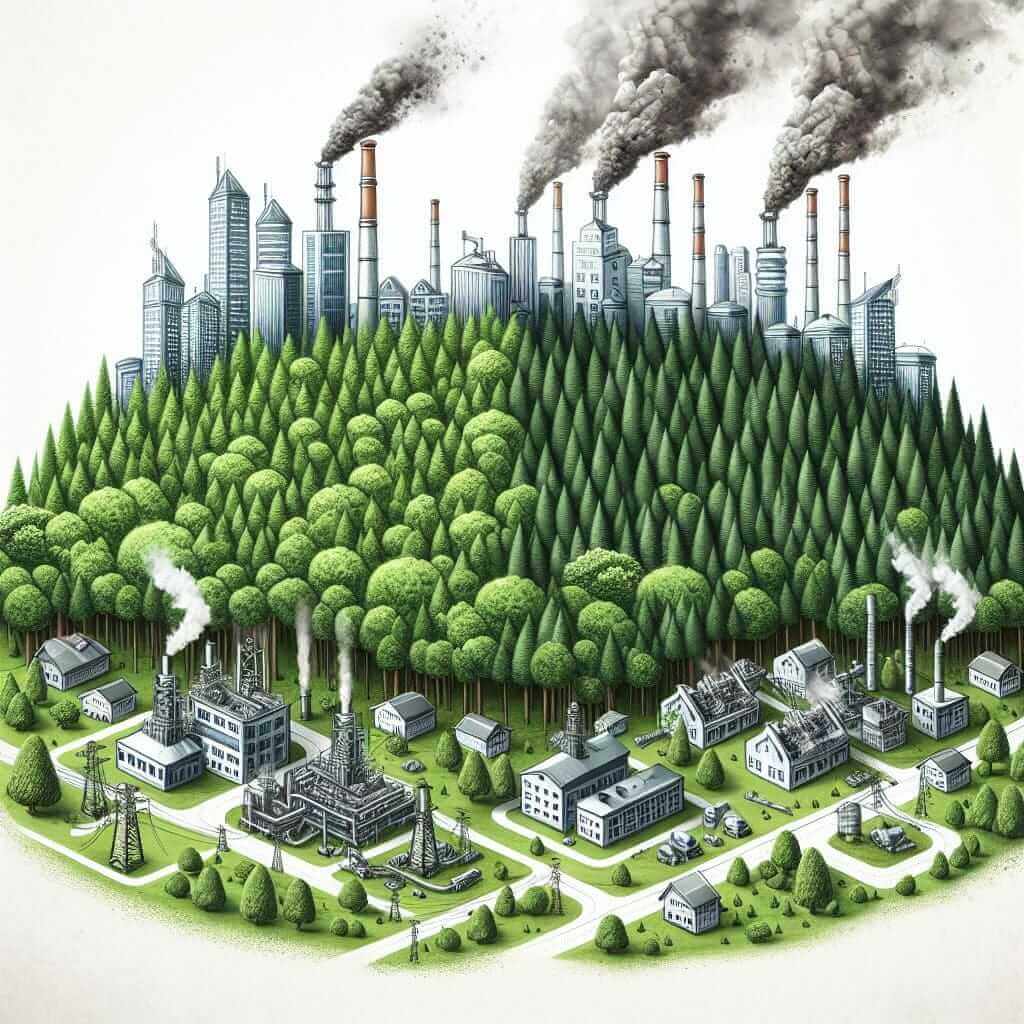Deforestation, the clearing of forests for various uses such as agriculture, urbanization, and logging, has emerged as a pressing global concern due to its profound effects on climate change. This intricate relationship often features in IELTS Writing Task 2, prompting candidates to analyze and present their views on this critical environmental issue.
Analyzing past IELTS exams reveals a recurring pattern of questions related to deforestation and its impact on climate change. Some variations of this topic that have appeared in previous tests include:
- “Discuss the negative effects of deforestation on the environment and suggest possible solutions.”
- “To what extent is deforestation a contributing factor to climate change? Discuss.”
- “Some people believe that deforestation is a necessary evil for economic progress. To what extent do you agree or disagree?”
Given the urgency and relevance of this topic in today’s world, it is highly probable that similar questions will continue to appear in future IELTS exams. Mastering the vocabulary and arguments surrounding deforestation and climate change is crucial for IELTS test-takers aiming for a high band score.
Sample IELTS Writing Task 2 Question:
“Deforestation is a major contributor to climate change. To what extent do you agree or disagree with this statement? Give reasons for your answer and include any relevant examples from your own knowledge or experience.”
Analysis of the Question:
This question requires you to take a clear stance on whether you agree or disagree that deforestation is a major contributor to climate change. It is crucial to provide strong arguments to support your position and illustrate them with relevant examples.
Model Essay:
Deforestation has emerged as a pressing global issue, with far-reaching consequences for the planet’s climate. It is unequivocally a major contributor to climate change, and I strongly agree with this statement. This essay will explore the intricate link between deforestation and climate change, examining its multifaceted impacts and emphasizing the urgent need for action.
Foremost among the detrimental effects of deforestation is its impact on the carbon cycle. Trees play a vital role in absorbing carbon dioxide from the atmosphere through photosynthesis, acting as natural carbon sinks. However, when forests are cleared or burned, this stored carbon is released back into the atmosphere, significantly increasing the concentration of greenhouse gases. The Intergovernmental Panel on Climate Change (IPCC) estimates that deforestation contributes to roughly 10% of global greenhouse gas emissions annually, a staggering figure that underscores the severity of the issue.
Furthermore, deforestation disrupts local and regional climate patterns. Forests play a crucial role in regulating water cycles, preventing soil erosion, and moderating temperatures. The removal of tree cover disrupts these delicate balances, leading to more extreme weather events such as floods, droughts, and heatwaves. For instance, the Amazon rainforest, often referred to as the “lungs of the planet,” plays a critical role in regulating rainfall patterns across South America. However, rampant deforestation in the region has been linked to increased droughts and decreased agricultural yields, impacting livelihoods and food security.
While some argue that deforestation is a necessary evil for economic progress, this view overlooks the long-term economic consequences of environmental degradation. The short-term economic gains from activities like logging or clearing land for agriculture are often outweighed by the long-term costs of climate change impacts, such as reduced agricultural productivity, increased healthcare expenses, and damage from extreme weather events.
In conclusion, the evidence overwhelmingly points to deforestation as a major contributor to climate change. Its disruption of the carbon cycle, disruption of local climate patterns, and long-term economic consequences cannot be ignored. Addressing this critical issue requires a multi-pronged approach, including sustainable forest management practices, reforestation initiatives, and a global commitment to reducing greenhouse gas emissions. By protecting and restoring our planet’s forests, we can mitigate the impacts of climate change and preserve a healthy planet for future generations.
Word Count: 330 words

Notes for Writing:
- Cause and Effect Language: Use language that clearly demonstrates the cause-and-effect relationship between deforestation and climate change.
- Examples: “contributes to,” “leads to,” “results in,” “as a consequence,” “due to.”
- Supporting Evidence: Back up your claims with specific examples, data, or reports from reputable sources like the IPCC.
- Counter-Argument and Refutation: Acknowledge the opposing view that deforestation is necessary for economic growth but refute it by highlighting the long-term economic costs of environmental damage.
Difficult Vocabulary:
- Deforestation (noun) /ˌdiːˌfɒrɪˈsteɪʃn/: The action of clearing a wide area of trees.
- Climate Change (noun) /ˈklaɪmət ˌtʃeɪndʒ/: A long-term change in the average weather patterns that have come to define Earth’s local, regional and global climates.
- Carbon Cycle (noun) /ˈkɑːrbən ˌsaɪkəl/: The series of processes by which carbon compounds are interconverted in the environment, chiefly involving the incorporation of carbon dioxide into living tissue by photosynthesis and its return to the atmosphere through respiration, the decay of dead organisms, and the burning of fossil fuels.
- Greenhouse Gases (noun) /ˌɡriːnhaʊs ˈɡæsɪz/: A gas that contributes to the greenhouse effect by absorbing infrared radiation, e.g., carbon dioxide and chlorofluorocarbons.
- Mitigation (noun) /ˌmɪtɪˈɡeɪʃn/: The action of reducing the severity, seriousness, or painfulness of something.
Conclusion:
This article has provided a comprehensive guide to understanding and writing about the impact of deforestation on climate change in the context of IELTS Writing Task 2. Remember to practice writing essays on this and similar topics, using a variety of vocabulary and grammatical structures to effectively convey your ideas. For more practice, you can also explore related IELTS topics like the impact of climate change on disaster frequency or the effects of climate change on agricultural yields.